Hair Transplant Solutions
Hair Transplant →A minimally invasive procedure where hairs are extracted individually and restored to thinning areas. Beard Transplant →Restore facial hair density and create your desired beard shape with precision follicle placement.Hair Transplant 101
Find your pricingBefore & AftersOur MethodOur DoctorsUse your superFree Info GuideFAQHair Transplant Clinics
MelbourneSydneyBrisbanePerthGold CoastWe also have offerings in: Adelaide, Hobart, Newcastle, Townsville, Parramatta, Sunshine Coast, Canberra, Bondi, Wollongong, & Geelong.
Related Blogs
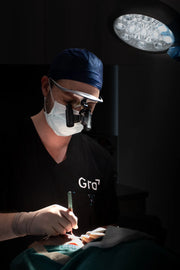
How to Choose a Safe Hair Transplant Clinic in Australia
Hair restoration is becoming more common in Australia, but not all providers meet the same medical standards. In this article, Dr Anwar from Gro Clinics Sydney explains the key red flags to look for when choosing a hair transplant clinic—so you can make a safe, informed decision.
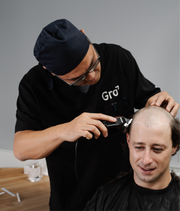
Your Hair Transplant Timeline: What to Expect Before, During and...
Considering hair restoration? In this edition of Hair Loss 101, we walk you through what to expect before, during, and after a procedure at Gro Clinics, using our refined approach to follicular unit extraction (FUE) with a focus on precision and comfort.
Non-Surgical Solutions
Prescription HaircarePlatelet Rich FibrinGrowth Factor TherapyLow Level Light TherapyScalp MicropigmentationFotona HAIRestart LaserScalp MicroneedlingExomide Scalp TreatmentView AllHair Loss 101
Stages of Hair LossHair Loss Treatment Clinics
Regen at Pac FairRelated Blogs

How Hair Grows: Anagen, Catagen, Telogen & Exogen Hair Phases
Ever wondered what’s really happening on your scalp? Hair doesn’t just grow—it cycles. In this edition of Hair Loss 101, we break down the science behind the four distinct stages of hair growth and why understanding them is essential to managing hair thinning or loss.
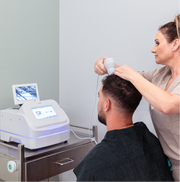
6 Common Causes of Hair Loss
The Norwood Scale, also known as the Norwood-Hamilton Scale, is the standard classification system for male pattern hair loss. Whether you're just starting to notice thinning or exploring hair restoration options, understanding the scale is a helpful first step. Here's everything you need to know.
Related Blogs

Best Foods to Support Healthy Hair Growth
A balanced diet plays a critical role in maintaining overall health—including the health of your hair and scalp. Nutritional deficiencies can impact the normal hair growth cycle, contributing to ex...

How Often Should You Really Wash Your Hair?
One, two, three, one, two, three, wash. How often should we really be washing our hair? Between how sensitive hair can be, and how easy it is to under-or overdo washing, we decided to deep dive int...
Related Blogs

10 Years of Hair Transplants in Australia: Gro Clinics’ Journey
In 2014, Gro Clinics opened its first hair transplant clinic in Sydney, aiming to change how Australians approach hair restoration. With one doctor and one nurse, our mission was clear: deliver ethical, medically guided care for hair loss. Today, that mission continues - across a national network of doctor-led clinics in Australia and New Zealand.

What We've Learned Over The Decade.
Over the past decade, Gro Clinics has grown from a single clinic to a network with locations in Sydney, Melbourne, Brisbane, Perth, the Gold Coast, and Auckland. Each clinic offers in-person consultations and assessments, providing personalised recommendations based on each client’s goals and medical needs.
Non-Surgical Solutions
Prescription HaircarePlatelet Rich FibrinGrowth Factor TherapyLow Level Light TherapyScalp MicropigmentationFotona HAIRestart LaserScalp MicroneedlingExomide Scalp TreatmentView AllHair Loss 101
Stages of Hair LossHair Loss Treatment Clinics
Regen at Pac FairRelated Blogs

How Hair Grows: Anagen, Catagen, Telogen & Exogen Hair Phases
Ever wondered what’s really happening on your scalp? Hair doesn’t just grow—it cycles. In this edition of Hair Loss 101, we break down the science behind the four distinct stages of hair growth and why understanding them is essential to managing hair thinning or loss.

6 Common Causes of Hair Loss
The Norwood Scale, also known as the Norwood-Hamilton Scale, is the standard classification system for male pattern hair loss. Whether you're just starting to notice thinning or exploring hair restoration options, understanding the scale is a helpful first step. Here's everything you need to know.
Scalp Care Products
Hair Growth SupplementsHair Repair MaskScalp Massager BrushSoothing ShampooVolume ConditionerHydrating ConditionerView AllScalp Care Bundles
Hydrate DuoVolume DuoHydrate Hair Health PackVolume Hair Health PackHydrate Ultimate PackVolume Ultimate PackView AllRelated Blogs

Best Foods to Support Healthy Hair Growth
A balanced diet plays a critical role in maintaining overall health—including the health of your hair and scalp. Nutritional deficiencies can impact the normal hair growth cycle, contributing to ex...

How Often Should You Really Wash Your Hair?
One, two, three, one, two, three, wash. How often should we really be washing our hair? Between how sensitive hair can be, and how easy it is to under-or overdo washing, we decided to deep dive int...
Related Blogs

10 Years of Hair Transplants in Australia: Gro Clinics’ Journey
In 2014, Gro Clinics opened its first hair transplant clinic in Sydney, aiming to change how Australians approach hair restoration. With one doctor and one nurse, our mission was clear: deliver ethical, medically guided care for hair loss. Today, that mission continues - across a national network of doctor-led clinics in Australia and New Zealand.

What We've Learned Over The Decade.
Over the past decade, Gro Clinics has grown from a single clinic to a network with locations in Sydney, Melbourne, Brisbane, Perth, the Gold Coast, and Auckland. Each clinic offers in-person consultations and assessments, providing personalised recommendations based on each client’s goals and medical needs.
Hair Transplant Solutions
Hair Transplant →A minimally invasive procedure where hairs are extracted individually and restored to thinning areas. Beard Transplant →Restore facial hair density and create your desired beard shape with precision follicle placement.Hair Transplant 101
Find your pricingBefore & AftersOur MethodOur DoctorsUse your superFree Info GuideFAQRelated Blogs
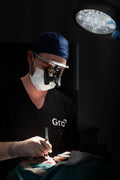
How to Choose a Safe Hair Transplant Clinic in Australia
Hair restoration is becoming more common in Australia, but not all providers meet the same medical standards. In this article, Dr Anwar from Gro Clinics Sydney explains the key red flags to look for when choosing a hair transplant clinic—so you can make a safe, informed decision.
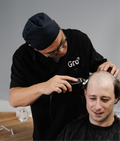
Your Hair Transplant Timeline: What to Expect Before, During and...
Considering hair restoration? In this edition of Hair Loss 101, we walk you through what to expect before, during, and after a procedure at Gro Clinics, using our refined approach to follicular unit extraction (FUE) with a focus on precision and comfort.
Cookie policy
We use cookies and similar technologies to provide the best experience on our website. Refer to our Privacy Policy for more information.
Your cart is empty
Continue shopping

Finasteride Prescription Guidelines | Gro Clinics
Manage Hair Loss & Male Pattern Baldness with Prescriptive Finasteride
Learn everything you need to know about the Prescription Medication, Finasteride, and its efforts in managing hair loss for suitable Australians. Want to discuss your options for hair loss management?
WHAT IS FINASTERIDE?
Learn more about Finasteride and what it can do for you.
Finasteride is a prescription medication primarily used to address male pattern hair loss. It works by targeting specific hormones linked to hair thinning and loss. Itts main function is managing hair loss by reducing hormone levels that contribute to balding. As with any treatment, its use should be guided by a qualified healthcare professional.
BOOK YOUR FREE CALLHow does Finasteride work?
Finasteride works by blocking the production of a male hormone in the scalp that contributes to hair loss. This hormone, in excess, leads to hair thinning and eventual balding. By reducing its levels, Finasteride helps slow hair loss and, in some cases, promotes regrowth. This treatment is typically prescribed for hereditary male pattern baldness but can also be considered when lifestyle factors contribute to hair loss.
Finasteride is taken orally in tablet form and is commonly available under the brand names Propecia and Proscar. Its effectiveness depends on individual factors, and results may vary. As with any medication, Finasteride should be used under the guidance of a healthcare professional.
Who can use Finasteride?
Finasteride is a prescription medication used in certain cases to manage male pattern hair loss. It is typically prescribed for adult men and is not generally recommended for women or children.
The effects of Finasteride vary between individuals, and any changes in hair growth should be discussed with a healthcare professional. If treatment is discontinued, hair loss progression may resume, but the response differs from person to person. A doctor can provide more information on whether this medication is suitable for your specific needs.
How to use Finasteride at home?
After receiving a prescription from your doctor, Finasteride can be dispensed through a pharmacy or delivery service, depending on your preferences. Your healthcare provider can advise on the most convenient way to obtain your medication.
This medication is typically taken once daily, as prescribed. Always follow your doctor’s instructions and avoid adjusting your dosage unless advised to do so. Taking more than the recommended amount will not improve results and could increase the risk of side effects.
Finasteride is generally intended for adult men. Women and children should not use this medication, and its suitability should always be determined in consultation with a registered healthcare professional.
What hair loss conditions can be treated with Finasteride?
Finasteride is a prescription medication that may be used to manage androgenic alopecia, also referred to as male pattern hair loss. This condition often leads to gradual thinning of hair or receding hairlines in men.
The medication works by targeting active hair follicles to slow hair loss. For individuals with complete hair loss in certain areas, Finasteride may not be effective, as inactive or damaged hair follicles cannot typically be revived.
It is important to note that the effectiveness of Finasteride varies between individuals. Some men may observe improvements in hair thickness or regrowth, while others may experience slower progression of hair loss. A healthcare professional can provide personalised advice based on your specific condition.
Are there any side effects of Finasteride?
A small percentage of individuals may experience side effects, which can include:
- Skin rashes
- Breast enlargement
- Depression and anxiety
- Diarrhea
- Dizziness
- Sexual dysfunction, including erectile dysfunction, or impotence
Further information on the potential side effects of Finasteride can be found on the product’s information sheet if needed. If you experience side effects or have concerns about your symptoms, consult a healthcare professional for guidance.
Some side effects may resolve after stopping the medication, but experiences vary. Speak with a doctor if you have concerns.

Benefits of Finasteride For Hair Loss
A hair transplant from a trusted doctor is the most effective means of addressing hair loss, comprising 99% of surgical management methods of hair loss. However, a healthcare professional may advise a Finasteride prescription as an alternative means of managing the symptoms associated with androgenic alopecia. If you choose to take Finasteride tablets to help treat your hair loss, the medication may provide benefits such as:
- Targeting of specific hormones associated with hair thinning
- Can be used alongside prescriptive Minoxidil
- Typically prescribed as a once-daily tablet
- Can be used as part of a long-term hair loss management plan
- May help maintain hair in areas with active follicles (results vary)
- Can be taken orally (under medical supervision)
- Some individuals may notice changes in certain areas of the scalp
The results of taking Finasteride as a prescription medication vary depending on the individual. This includes the projected timeline in which results may begin to be seen. During your initial medical consultation, the healthcare professional may offer insight into how Finasteride can benefit you and when visible results may appear.
BOOK YOUR FREE CALLTHE PROCESS
How to Get Your Prescription Haircare Medications With Gro Clinics
1.
Telehealth Consultation
Get started from the comfort of your home. Our practitioners will delve into your medical history, lifestyle, and hair loss concerns to gather a full understanding of your situation.
2.
Personalised Prescription
Based on your consultation, our practitioners will create a prescription that addresses your needs. This tailored approach ensures that every aspect of your hair health is taken into account.
3.
Your Subscription
A summary of your treatment plan is sent to your phone for easy access. Just select your preferred subscription interval and add your favourite everyday care products to your order and we’ll take care of the rest.
4.
Discreet Delivery
Your personalised haircare regimen will be conveniently delivered in discreet packaging to your doorstep at your chosen interval. No need to visit a physical store – your journey to healthier hair begins with a simple click
Tailored Treatment
Shipped to your door.
Phone Consultation
Not just a quiz.
Free Reformulation
For peace of mind.
Free Shipping
In discreet packaging.
Free Cancellation
No lock in contracts.
THE GRO DIFFERENCE
We're just here for the people who want more hair.
Prescription haircare is not about selling products; it's about a comprehensive strategy designed to help you regain your hair. That is why the experienced team at Gro Clinics works alongside you to create a treatment for hair loss that meets your unique needs.
With real and free consultations conveniently available over the phone, we've taken the guesswork out of hair loss treatment. Get started today to diffuse thinning, restore your receding hairline, and bring back your hair's lustre through tailored medication.
Throughout your journey, our dedicated team of hair doctors are here to guide you. If you have questions, concerns, or just need advice, our team is only a message away.
Get a Finasteride Prescription Online With Gro Clinics
Gro Clinics has years of experience and expertise in creating hair loss management treatment plans, including the integration of prescription medications. Finasteride is one of many treatment options that can be used to manage hair loss for Australians living with male pattern hair loss.
That is why our Australian clinics help to connect patients with doctors for consultation and prescription services, such as those needed for Finasteride. Said doctors will assess hair loss concerns and recommend appropriate treatments if suitable, such as prescriptive Finasteride. If prescribed, your medication can be delivered in discreet packaging for your privacy.

Let's Talk.
Fill out the form and one of our specialists will be in touch soon.
Looking to book a consult? Click here to schedule instantly.
Prefer a phone call? Perfect, give us a call on
1300 787 563.
FREQUENTLY ASKED QUESTIONS
Got questions? We've got answers.
Does Finasteride require a prescription?
In Australia, you need a prescription from a trusted healthcare provider in order to obtain Finasteride. It is not available without a prescription.
You can work with your local Gro Clinics and their experienced practitioners to determine what prescription works for you.
Can my GP prescribe Finasteride?
Yes, your local General Practitioner can prescribe Finasteride. However, other healthcare providers with prescription services can also help you obtain the medication.
Gro Clinics has a team of doctors that can legally prescribe and supply you with your recommended dosage of Finasteride. This makes the process more convenient than ever as you can sort everything out online, including delivery straight to your door.
Why do men not take Finasteride?
Some men choose not to take Finasteride due to the possibility of developing some of the more notable side effects. Common causes for concern include disrupted sexual function, low moods or enlarged breasts.
However, there is only a possibility of developing these side effects. Many men take Finasteride tablets for years and experience no side effects at all.
Can you still go bald on Finasteride?
Ultimately, Finasteride focuses on significantly slowing down the rate of hair loss. It does not permanently stop it or reverse it. This means that those with rapid hair loss rates may still find themselves losing hair steadily over the years.
However, rather than going bald at a young age, Finasteride ensures you can get several more years with a healthy head of hair.